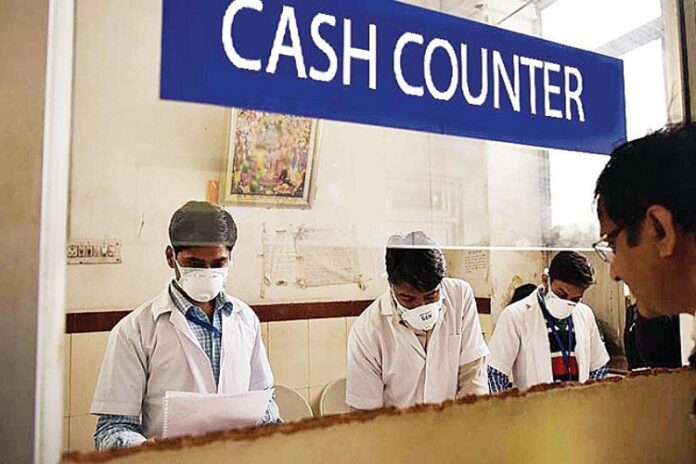Origin of the word hospital and its derivatives basically mean shelter and care for the needy. There is history of such places being established and run by philanthropists and others. The direct involvement of state seems to have come at some later stage.
Today health care is considered among priorities of governments. Hospitals are a corollary thereof. Yet, even essential medicines are not always available to the poor.
The demand for healthcare in hospitals set up by government and local bodies far exceeds the availability. Inadequacies at primary and secondary health centres constrain the sick to gravitate towards district hospitals. Recent initiative by the government to privatise certain services in District Hospitals in tier-2 and-3 towns is likely to further jeopardise healthcare for the poor when even now essential medicines are not available free of cost.
Private clinics and hospitals set up by individual or group of doctors, charitable mission’s etc step into the hiatus. Very few hospitals including charitable ones do enough to look after the poor and indigent free of cost.
Persons needing decent inpatient care and willingness to pay, opt for private hospitals. Not for a moment is it suggested that government doctors are in any way inferior. In fact government doctors are as good if not better than private ones, as they have crossed another qualifying mark in the process of selection. Necessity dictates the choice in case of most while expectation of better facilities, and comfort is the criterion for others.
But there is a rub here as there is no clear estimate of what one would have to pay after the hospitalisation is over. Granted that providing health care is their “business”, it doesn’t preclude ethical behaviour from their management. Admissions are made only after an advance has been paid and periodical bills paid when presented. The issue acquires greater significance for the marginal patients, who are constrained to knock on private hospitals doors, despite their strained financial circumstances. It is no secret that in hundreds of cases the relatives of patients are driven to sell their valuable and lands to get the patient treated. It should be incumbent upon the concerned doctor to advise the relatives suitably in case of terminally ill persons.
There are several private hospitals run by dedicated doctors to provide quality healthcare. They are proficient, compassionate and service is their primary aim; attributes that have earned them trust essential for recovery of patients.
Once a patient has been admitted, there are some routine services that will be availed by all inpatients. Yet, charges are levied for items over and above the room charges. It is illogical to argue that a patient admitted on advice and under care of hospital’s doctor, has to pay each time a doctor visits the patient to monitor. Similarly, charges are levied on “visits” by the dietician, administering of injections or just attaching a drip.
NABH accreditation is supposed to ensure quality service to its patients. To get empanelled by PSUs and others boosts private hospitals. Their boards prominently display the names of PSUs on whose panels they are on. Whether they abide by the NABH credo is a moot point.
A look at the number of procedures and diagnostic tests carried out on CPU backed patients vis-a-vis other private individuals under treatment at these hospitals is revealing. Percentage of unnecessary C-sections performed in government hospitals is much lower than in private hospitals. Similarly a look at other surgeries carried out may also give a fair indication.
Outpatients too are not spared and may be prescribed a host of tests. A well rehearsed vocabulary has been developed to justify the prescribed tests.
Corporate hospitals are a 5 star version of private hospitals. Some decades ago, middle level sheikhs from oil rich countries and other countries started coming to India for treatment as it was much cheaper than in developed countries. (However foreigners seeking treatment are in good measure attracted to Ayurveda and Unani systems as well).
They have a pool of specialists but have become unaffordable to ordinary Indians. Unfortunately many of them have earned the dubious distinction for acts of commission, giving a wide berth to ethical practices. They draw an iron curtain, not allowing even family members to visit or even speak to the patient or keeping them informed. With no outside interaction, the diagnosis and treatment and propriety of procedures are carried out for which the patient is later billed.
Corporate hospitals are companies in business, for profit. It is easy enough to cultivate powerful friends, as after all they may also need their services. Concern for human suffering and compassion is posited against maximising their revenues, when hundreds of rupees are charged for administering water to a dying patient and for a dietician’s visit!
Practice of levying differential charges from patients in the general wards, private and semi private rooms is hardly ethical. The more “serious” the ailment, more the opportunities for earning higher profits.
Cancer is only one such ailment. Drugs falling in Schedule H and X are used in procedures like chemotherapy and are not sold in the market, but supplied directly to pharmacies run by them. These are administered to the patients, more often than not, at prices with a margin of any where up to 200%. Many of these are costing tens of thousands of rupees.
Instances are not uncommon, when literally a dying patient has been billed for such a drug on the plea of making a last ditch effort. Relatives consent and hesitation in withdrawing life support result from inadequate guidance. The discharge of dying patients means low inpatient death figures.
There is need for openness, detailed discussions and keeping the family in the loop. A patient is a customer and can’t be denied second or as many opinions as patients or their caretakers want.
It is necessary to devise a system of audit by a statutory body, which has powers to examine their records, charges, diagnoses, and essentiality of tests prescribed, procedures and medication prescribed. Threat of cancellation of NABH accreditation and publicising the same can help keeping the errants in line. #KhabarLive #hydnews







